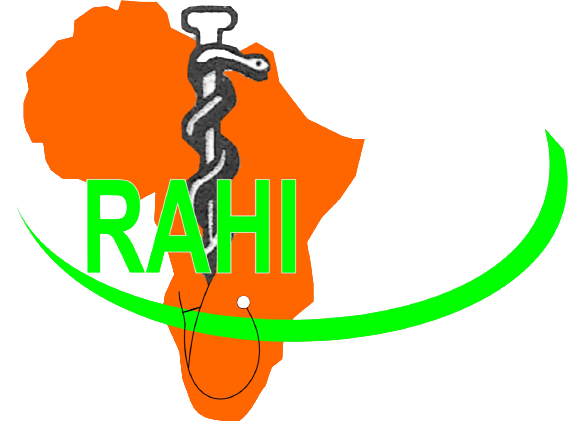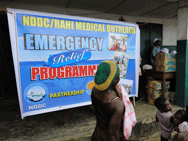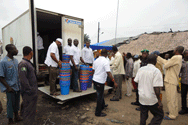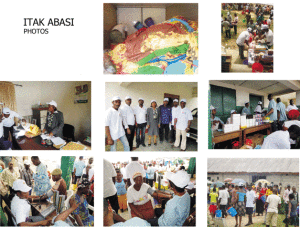Itak Abasi community is located on the Atlantic Coast in Ibeno Local Government Area of Akwa Ibom State. It is predominantly a fishing community; here fishing activity is carried out on a commercial level, and that has held the people bound to that milieu for life. The Itak Abasi people continue to live much as they have for hundreds of years – like the coconut tree, changing, but unbroken by the winds of change,
However, in its greenness and freshness, the Island conjures up visions of unending youth and a heavenly paradise – crystal clear waters, sparkling white sand and surf; until catastrophe struck.
In mid August, 2010, Itak Abasi residents was woken up by the over flooding of their community by the Atlantic Ocean. Niger Delta Development Commission ( NDDC), as an interventionist agency responded by visiting the community to ascertain the extent of the damage. NDDC discovered that the extent of the disasters was immense; livestock lost, human beings displaced by the flood, and houses washed away by the tides.
This informed the Executive Director of Projects, NDDC to ask the RAHI team to move in on the 22nd of August, 2010, as a matter of urgency to respond to the victims.
The RAHI team mobilized a total of 10 Medical Doctors, 5 Nurses, 15 Volunteers and 10 Crowd control agents, making a total of 40 personnel. An advance team of 3 personnel was sent to assess needs on the 20th of August, 2010, which informed procurement for the following items:
2,000 buckets
2,000 blankets
1,500 long lasting insecticide treated nets (Iconets)
2,000 insecticides
5 bales of clothing
1,000 ACTS’
2,000 ORTS’
30 tents
400 cartons (1litre bottles) of Voltic Water
I.E.C. Materials (Caps, T-Shirts, Posters, etc)
5 Microbiological Purifiers (Life Straw Packs)
On arrival in Itak Abasi on the 22nd of August, 2010, RAHI team engaged the community leaders in an interactive session; this facilitated the sampling of the community into groups: Men, Women, pregnant women, Nursing mothers, Youths/Children. This informed the programmed pattern of Guidance and Counseling, and re-assurance of victims that NDDC and the Government cares.
On Monday, the 23rd of August, 2010, the team of Doctors and Nurses commenced out-patient consulting at about 8.30am – identifying children and persons with ailments associated with diarrhea, dysentery, gastroenteritis, typhoid, malaria, anemia and commenced management.
Over 600 patients including women and children were classified and treated for malaria and other related ailments.
The team of Volunteers commenced the distribution of Relief materials according to needs assessment, as the community was grouped into household and materials distributed accordingly.
A total of 205 pregnant women and breast feeding mothers received items which included ACTs LLITN, TENTs buckets blankets haematinics, ORS e.t.c while adults and youths made up the number which amounted to about 1,918 persons.
RAHI found out that the community was uninformed on diseases of public health importance, so they were grouped into households and educated on collecting rain water and boiling before drinking. They were also advised to utilize the pit latrines available instead of defecating along the shores, as it will still be washed back to the community.
Embarking on Project
Carrying Emergency Relief Materials
CEO,Dr. Chris Ekiyor Presenting Relief Materials
MONITORING AND EVALUATION
RAHI Team reviewed responses of patients and challenges that were immediately attended to. Counseling was given to patients who were presented with traumatic stress syndromes; patients were assured with government commitment to alleviating their situation with time.
Evaluation figures showed that, on Monday the 23rd of August 2010, 600 patients were attended to. On Tuesday 1,921 persons turned out; on Wednesday 750 patients turned out. Out of these 156 were pregnant women and breast feeding mothers while 565 were children between the ages of 2-12years. While on Thursday more out-patient consulting were done, embellished with public health lectures and seminars.
lessons learnt:
There is the need for NDDC and RAHI to be more proactive in subsequent eventualities, as on arrival of RAHI Team, people had already been exposed to hardship.
Relief Materials were inadequate as displaced people had to paddle in from neighbouring fishing settlements to benefit from the Emergency Relief Programme.
Follow up is highly recommended, so as to distribute fishing gears, as the fishing nets of the people had been washed away by the tides; fishing being the predominant occupation of the residents, and will form part of the empowerment programme. Tents were inadequate, as the 30 tents given out was not evenly distributed.
SUMMARY:
In conclusion, we believe that NDDC and RAHI can do more if the budgetary provision is made available as at when due.
The Emergency Relief Mission was a huge success, as RAHI Medical Outreach was commended and NDDC was applauded by the community. According to the Counselor of the Ward,”RAHI by far is in the lead in terms of how they get their policy implemented. The Federal and state representatives have been here, Exxon Mobil has also been here, but what has impressed me is the speed with which RAHI have been able to move from strategy to service delivery”.
This statement is a morale booster and confirms a positive move in the right direction, towards helping humanity, and a great stride to our sponsors; Niger Delta Development Commission (NDDC).



